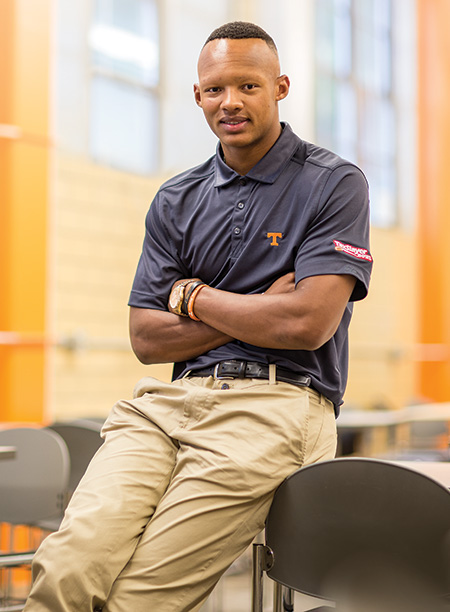One of the key educational components stressed by UT’s College of Engineering is that students partake in a co-op or paid internship during their time on campus.
That holds true whether you’re an average Jane or Joe, or even a Josh.
Joshua Dobbs might be better known outside the college as the quarterback of the nation’s number 25 football team, but, like six other members of the Vols in engineering, once in the classroom, he is all about his studies.
An aerospace engineering student, Dobbs recently had the opportunity to spend time on an internship experience with Pratt and Whitney, one of the world’s leading jet and rocket engine manufacturers, something he said was beneficial to his future studies and life after college and football.

Joshua Dobbs
“The most valuable benefits I received were the firsthand experience gained in engine systems analysis and the connections I made at Pratt and Whitney,” said Dobbs. “I met engineers from each division of the company who gave me their personal insight into the importance of their divisions.”
Like other UT athletes in engineering—twenty-eight across nine men’s and women’s sports registered for the fall semester—one of the challenges of gaining that hands-on experience was working around Dobbs’s sometimes hectic sports calendar.
Once Pratt and Whitney extended the opportunity to Dobbs, the Office of Engineering Professional Practice within the college helped to ensure that those needs and details could be accommodated, just as it does for all students.
“We provided him the same resources we do anyone else, such as training on what to expect at the assignment and how to make a positive impression on the employer,” said Todd Reeves, director of the office. “The fact that he was able to squeeze the experience in speaks volumes about his drive and desire to become the best aerospace engineer he can be.”
Just as Dobbs was treated like any other student on UT’s side, Pratt and Whitney also made sure his experience there was no different than any other intern’s.
To that end, Dobbs was assigned to work in the System Engineering and Validation Department. There, he helped test and analyze data on the F135 engine that powers the military’s new F-35 fighter jet.
Dobbs explained that in order to complete his daily tasks he had to gain a full understanding of each component of a jet engine, and that he didn’t hesitate to seek a better grasp of the various parts and systems by consulting manuals or other engineers.
Part of his training also included learning how to operate the head test engineer’s run screen, which consisted of various graphs, gauges, and limits that must be monitored throughout testing.
“Being a test engineer requires very sharp attention to detail,” said Dobbs. “The engines that you work on are very extensive, tedious, and expensive. So it is important that you monitor every possible aspect of them.”
As for other students seeking co-op or internship experiences, Dobbs said it was important to get to know as many people in various departments within the company as possible. He pointed out that the path an engineer winds up taking within a company might not be the one they have in mind in school, so having exposure across different areas can help students both during school and on the job.
He pointed out that the path an engineer winds up taking within a company might not be the one they have in mind in school, so having exposure across different areas can help students both during school and on the job.